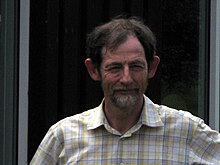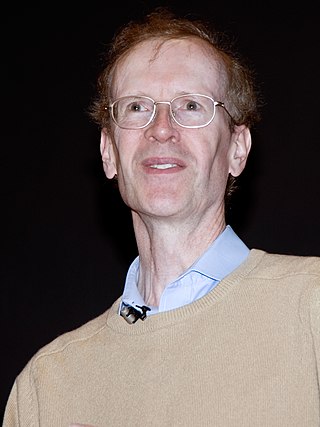
Sir Andrew John Wiles is an English mathematician and a Royal Society Research Professor at the University of Oxford, specialising in number theory. He is best known for proving Fermat's Last Theorem, for which he was awarded the 2016 Abel Prize and the 2017 Copley Medal by the Royal Society. He was appointed Knight Commander of the Order of the British Empire in 2000, and in 2018, was appointed the first Regius Professor of Mathematics at Oxford. Wiles is also a 1997 MacArthur Fellow.

Heriot-Watt University is a public research university based in Edinburgh, Scotland. It was established in 1821 as the School of Arts of Edinburgh, the world's first mechanics' institute, and subsequently granted university status by royal charter in 1966. It is the eighth-oldest higher education institute in the UK. The name Heriot-Watt was taken from Scottish inventor James Watt and Scottish philanthropist and goldsmith George Heriot.

George Porter, Baron Porter of Luddenham, was a British chemist. He was awarded the Nobel Prize in Chemistry in 1967.

The School of Informatics is an academic unit of the University of Edinburgh, in Scotland, responsible for research, teaching, outreach and commercialisation in informatics. It was created in 1998 from the former Department of Artificial Intelligence, the Centre for Cognitive Science and the Department of Computer Science, along with the Artificial Intelligence Applications Institute (AIAI) and the Human Communication Research Centre.
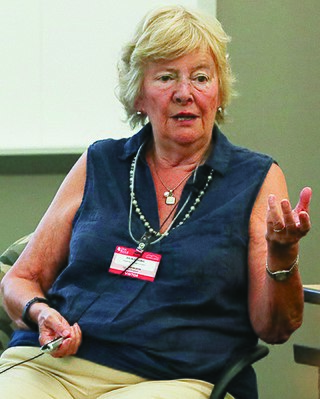
Dame Julia Stretton Higgins is a British polymer scientist. Since 1976 she has been based at the Department of Chemical Engineering at Imperial College London, where she is emeritus professor and senior research investigator.
Prof Arthur Geoffrey Walker FRS FRSE was a British mathematician who made important contributions to physics and physical cosmology. Although he was an accomplished geometer, he is best remembered today for two important contributions to general relativity.
Sir Charles Maurice Yonge, CBE, FRS FRSE was an English marine zoologist.

Alan Richard Bundy is a professor at the School of Informatics at the University of Edinburgh, known for his contributions to automated reasoning, especially to proof planning, the use of meta-level reasoning to guide proof search.
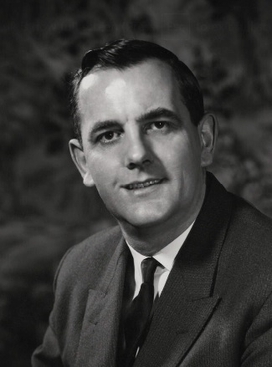
Sir Basil John Mason was an expert on cloud physics and former Director-General of the Meteorological Office from 1965 to 1983 and Chancellor of the University of Manchester Institute of Science and Technology (UMIST) from 1994 to 1996.
Henry Keith Moffatt, FRS FRSE is a Scottish mathematician with research interests in the field of fluid dynamics, particularly magnetohydrodynamics and the theory of turbulence. He was Professor of Mathematical Physics at the University of Cambridge from 1980 to 2002.
John Francis Toland FRS FRSE is an Irish mathematician based in the UK. From 2011 to 2016 he served as Director of the Isaac Newton Institute for Mathematical Sciences and N M Rothschild & Sons Professor of Mathematical Sciences at the University of Cambridge.
David John Finney, was a British statistician and Professor Emeritus of Statistics at the University of Edinburgh. He was Director of the Agricultural Research Council's Unit of Statistics from 1954 to 1984 and a former President of the Royal Statistical Society and of the Biometric Society. He was a pioneer in the development of systematic monitoring of drugs for detection of adverse reactions. He turned 100 in January 2017 and died on 12 November 2018 at the age of 101 following a short illness.
Sir Alistair George James MacFarlane was a Scottish electrical engineer and leading academic who served as Principal and Vice Chancellor of Heriot-Watt University, Edinburgh, and Rector, University of the Highlands and Islands.
Guy Charles Lloyd-Jones FRS FRSE is a British chemist. He is the Forbes Professor of Organic Chemistry at the University of Edinburgh in the United Kingdom. His research is largely concerned with the determination of organometallic reaction mechanisms, especially those of palladium-catalyzed coupling reactions such as Suzuki-Miyaura coupling.
Prof Ian Naismith Sneddon FRS FRSE FIMA OBE was a Scottish mathematician who worked on analysis and applied mathematics.
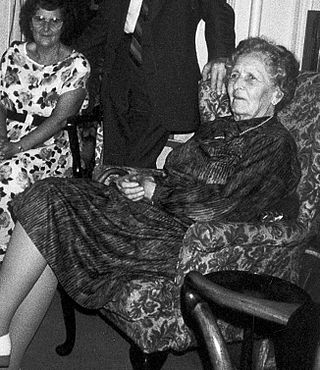
Lillian Mary Pickford was a pioneering British neuroendocrinologist. She was the first woman to be elected to the Pharmacological Society and the first woman appointed to a medical professorship at the University of Edinburgh.
Charles Kemball CBE PRSE FRS FRSC FRIC was a Scottish chemist who served as president of the Royal Society of Edinburgh (1988–91) and as president of the Royal Institute of Chemistry (1974-6). He pioneered the use of mass spectrometry. and was a leading expert in heterogeneous catalysis.
Dr Robert Allan Smith CBE FRS PRSE was a British mathematician and physicist.
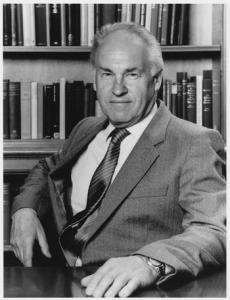
John Bryce McLeod, was a British mathematician, who worked on linear and nonlinear partial and ordinary differential equations.
Sir Harry Work Melville, was a British chemist, academic, and academic administrator, who specialised in polymer research. He spent his early career in academia as a lecturer and researcher, before moving into administration as a civil servant and university college head.
